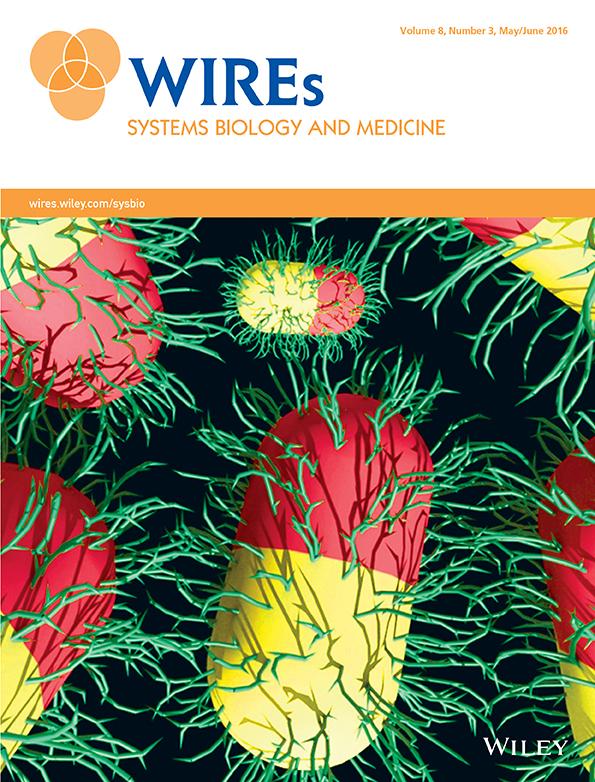Exploring cardiac form and function: A length‐scale computational biology approach
IF 7.9
Q1 Medicine
Wiley Interdisciplinary Reviews-Systems Biology and Medicine
Pub Date : 2019-12-02
DOI:10.1002/wsbm.1470
引用次数: 3
Abstract
The ability to adequately pump blood throughout the body is the result of tightly regulated feedback mechanisms that exist across many spatial scales in the heart. Diseases which impede the function at any one of the spatial scales can cause detrimental cardiac remodeling and eventual heart failure. An overarching goal of cardiac research is to use engineered heart tissue in vitro to study the physiology of diseased heart tissue, develop cell replacement therapies, and explore drug testing applications. A commonality within the field is to manipulate the flow of mechanical signals across the various spatial scales to direct self‐organization and build functional tissue. Doing so requires an understanding of how chemical, electrical, and mechanical cues can be used to alter the cellular microenvironment. We discuss how mathematical models have been used in conjunction with experimental techniques to explore various structure–function relations that exist across numerous spatial scales. We highlight how a systems biology approach can be employed to recapitulate in vivo characteristics in vitro at the tissue, cell, and subcellular scales. Specific focus is placed on the interplay between experimental and theoretical approaches. Various modeling methods are showcased to demonstrate the breadth and power afforded to the systems biology approach. An overview of modeling methodologies exemplifies how the strengths of different scientific disciplines can be used to supplement and/or inspire new avenues of experimental exploration.探索心脏形态和功能:一种长度尺度的计算生物学方法
将血液充分输送到全身的能力是存在于心脏许多空间尺度上的严格调节的反馈机制的结果。在任何一个空间尺度上阻碍功能的疾病都可能导致有害的心脏重塑和最终的心力衰竭。心脏研究的首要目标是在体外使用工程心脏组织来研究病变心脏组织的生理学,开发细胞替代疗法,并探索药物测试应用。该领域的一个共性是操纵跨越各种空间尺度的机械信号流,以指导自组织和构建功能组织。要做到这一点,需要了解如何利用化学、电和机械线索来改变细胞微环境。我们讨论了如何将数学模型与实验技术结合使用,以探索存在于众多空间尺度上的各种结构-功能关系。我们强调系统生物学方法如何在体外组织、细胞和亚细胞尺度上概括体内特征。具体的重点放在实验和理论方法之间的相互作用。展示了各种建模方法,以展示系统生物学方法的广度和能力。建模方法概述举例说明了如何利用不同科学学科的优势来补充和/或激发实验探索的新途径。
本文章由计算机程序翻译,如有差异,请以英文原文为准。
求助全文
约1分钟内获得全文
求助全文
来源期刊

Wiley Interdisciplinary Reviews-Systems Biology and Medicine
MEDICINE, RESEARCH & EXPERIMENTAL-
CiteScore
18.40
自引率
0.00%
发文量
0
审稿时长
>12 weeks
期刊介绍:
Journal Name:Wiley Interdisciplinary Reviews-Systems Biology and Medicine
Focus:
Strong interdisciplinary focus
Serves as an encyclopedic reference for systems biology research
Conceptual Framework:
Systems biology asserts the study of organisms as hierarchical systems or networks
Individual biological components interact in complex ways within these systems
Article Coverage:
Discusses biology, methods, and models
Spans systems from a few molecules to whole species
Topical Coverage:
Developmental Biology
Physiology
Biological Mechanisms
Models of Systems, Properties, and Processes
Laboratory Methods and Technologies
Translational, Genomic, and Systems Medicine
 求助内容:
求助内容: 应助结果提醒方式:
应助结果提醒方式:


